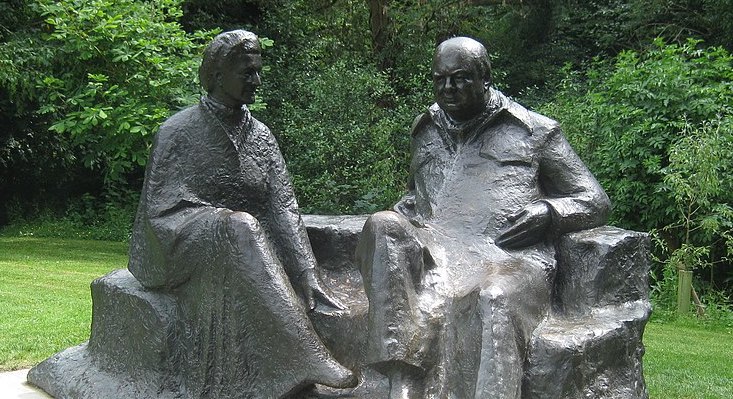New life to old aphorisms
“Command the Moment to Remain” is one of several Churchill remarks in my compilation of “Red Herrings” that he said but did not originate. Since, by quoting them, he gave these lines new life, I will break them out in a separate appendix in the new expanded edition of Churchill by Himself. Many readers today, who might not be aware of the original, learned these famous lines from Sir Winston.
Sometimes Churchill gave credit to the original author, sometimes not. Often he simply expected his audience to recognize the source. An example is his broadcast of 27 April 1941, ending, “But westward, look, the land is bright.” WSC didn’t bother to credit Arthur Hugh Clough and his poem, “Say Not the Struggle Nought Availeth.” He just assumed, in that better-read time, that every English schoolchild knew the words. Back then, they probably did.
“Command the Moment”: from Goethe’s Faust
The distinguished historian Andrew Roberts writes:
On Lake Como in 1945 Churchill, speaking to a Guards officer, “bids the fleeting moment to stay,” or something along those lines. Well, I came across this line from Somerset Maugham’s Up at the Villa (1941) where it says of the anti-Nazi Austrian hero: ‘He quoted that celebrated line of Goethe’s in which Faust, satisfied at length, begs the fleeting moment to stay.’ So I think WSC was quoting Goethe.”
Dr. Roberts has it right. “Command the moment to remain” was a lifetime Churchill expression. In his first public iteration, he credited the author:
Johann Wolfgang von Goethe. Speaking on “Art and Politics” at the Royal Academy Annual Banquet in London, 1 May 1927, Churchill declared:
We have been told that Faust sold his soul for the right to command the moment to remain. Our hosts enjoy in complete security—and without the slightest prejudice to their future destination [laughter]—the power to command the moment to remain, not only for their own advantage and reputation, but for the pleasure of everyone else.
“Shall we join the ladies?”
At British dinners of old, it was routine after a last course had finished for the ladies to retire to more comfortable seats in the drawing room whilst the gentlemen remained at table amidst port and cigars. (The port had always to be passed clockwise, even if the refill requested was on your right.) Then after a suitable interval the host would say, “Shall we join the ladies?”
On my first trip to England, old forms still prevailed here and there, so one night in Cumberland, as the ladies rose, I politely rose with them. “No, no!” said mine host. I was restrained with difficulty. This social custom has long died away. I suppose it is now considered misogynist. In 1974, we merely thought of it as a courtesy.
Ear witnesses
Winston Churchill was wont to “command the moment to remain” at exactly this juncture. His longtime private secretary,
Sir John Colville, wrote in his book,
The Churchillians: “Loth to join the ladies and allow the long-suffering servants to clear away, he would replenish his glass, relight his cigar (which was always going out) and quote the words of Dr. Faustus, ‘Let us command the moment to remain.'”
Sir Winston’s daughter Mary, Lady Soames—who never thought of herself as a victim of misogyny—reiterated Colville. Speaking of “Churchill as Father and Family Man” in Dallas in 1986, she recalled that
…mealtimes sometimes prolonged themselves into three-hour sessions, often to my mother’s despair. And so eventually she would make to move. And I so well remember my father looking at her down the table, lovingly and ruefully, and saying, “Oh, Clemmie, don’t go. It is so nice. Let us command the moment to remain.” Of course, one never can. But today I’ve tried to command some precious moments that I remember to remain.








3 thoughts on “Churchill Quoting Others: “Command the Moment to Remain””
What’s remarkable about this quote is that Churchill considered it to be the singular most important piece of wisdom he could pass on to another individual. Andrew Roberts writes that Churchill told two junior officers: “Out of a life of long and varied experience, the most valuable piece of advice I could hand on to you is to know how to command the moment to remain.”
Very timely; thank you for this!!
What a delightful recollection and reminder to us at this time of intense business.
Comments are closed.